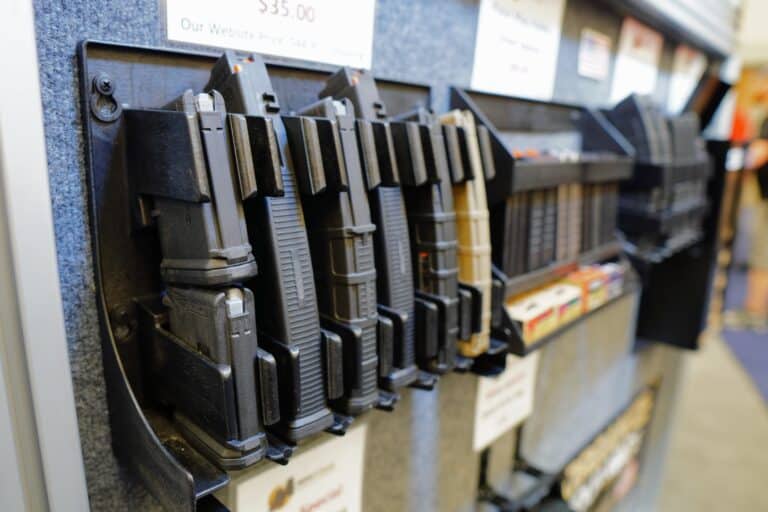Are ammunition magazines constitutionally protected arms? Or are they simply accessories incidental to the weapons covered under the Second Amendment?
Different judges have reached wildly different conclusions since the Supreme Court’s decision in NYSRPA v. Bruen last June, particularly regarding the so-called large capacity magazines often banned in blue states. It is no surprise then that the outcomes of the various legal challenges taking aim at those prohibitions have primarily been settled depending on which side a particular judge falls on this very question. Two major decisions handed down in the last week demonstrate this.
Last Friday, U.S. District Judge Roger Benitez struck down California’s ban on ammunition magazines capable of holding more than ten rounds.
“This case is about a California state law that makes it a crime to keep and bear common firearm magazines typically possessed for lawful purposes,” Judge Benitez wrote in Duncan v. Bonta. “Based on the text, history, and tradition of the Second Amendment, this law is clearly unconstitutional.”
Just three days later, U.S. District Judge Mary Dimke upheld Washington state’s nearly identical magazine ban.
“At present, the evidence in the record is insufficient to establish that Plaintiffs are likely to prove that large capacity magazines fall within the Second Amendment right,” Judge Dimke wrote in Brumback v. Ferguson.
Benitez argued that ammunition magazines are part and parcel of the functional operation of a firearm, which themselves are self-evidently “arms.” Therefore, the magazines themselves constitute arms in the same way for the purposes of the plain text of the Second Amendment.
“While the Second Amendment does not explicitly mention ammunition or magazines supplying ammunition, ‘without bullets, the right to bear arms would be meaningless,'” Benitez wrote. “This is because the right to keep firearms for protection implies a corresponding right to obtain the bullets necessary to use them.”
“By extension, ‘arms’ includes the magazine component necessary to supply the bullet into the chamber of the gun,” he added. “Consequently, whether thought of as a firearm able to fire a certain number of rounds because of its inserted magazine, or as a separate ammunition feeding component, magazines are usable ‘arms’ within the meaning of the Second Amendment.”
As a result, Benitez continued his Bruen analysis by reviewing the ban in light of the country’s historical tradition of arms regulation between the Founding Era and Reconstruction—ultimately dealing it a fatal blow.
Dimke, on the other hand, took a narrower reading of a particular historical definition of the word “arm” and concluded that magazines on their own did not fit the bill.
“A magazine is a part of a firearm, rather than a ‘weapon[] of offence, or armour of defence,’ or a ‘thing that a man wears for his defence, or takes into his hands, or useth in wrath to cast at or strike another,'” Dimke wrote, citing a definition of “arms” used in the Supreme Court’s Heller decision. “On its own, it cannot be used to attack or defend; a magazine with increased capacity simply reduces the frequency of reloads required when discharging a firearm.”
Once Dimke determined that magazines fell outside the scope of the Second Amendment’s text, her analysis was essentially complete—at least for the purposes of deciding whether to issue a preliminary injunction—and Washington’s ban was allowed to stand.
But even beyond the two most recent rulings, whether magazines are considered “arms” has thus far served as the critical juncture in several other federal decisions examining magazine bans after Bruen.
Before ultimately blocking Illinois’ ban on certain magazines and semi-automatic weapons, U.S. District Judge Stephen McGlynn sided with Benitez’s understanding of the question.
“This Court agrees that magazines are ‘arms’ as used in the plain text of the Second Amendment,” he wrote. “Plaintiffs are correct that ‘[t]his is not even a close call.’ If Defendants’ own expert incorporates magazine capacity into his definition of a firearm, given his level of expertise, it would be unreasonable to expect the original public meaning of the plain text to not reflect a similar understanding.”
Meanwhile, federal judges reviewing similar magazine bans in Oregon and Rhode Island upheld those states’ bans after ruling that the text did not apply to large capacity magazines.
“In sum, the evidence at trial shows that while magazines may be necessary to render firearms operable, [large capacity magazines], as a subset of magazines, are never necessary to render firearms operable,” Judge Karin Immergut wrote in Oregon Firearms Federation v. Kotek. “Accordingly, this Court finds that [large capacity magazines] are not ‘bearable arms’ as that term is used in Second Amendment jurisprudence.”
“The plaintiffs have failed in their burden to demonstrate that [large capacity magazines] are ‘Arms’ within the meaning of the Second Amendment’s text,” Judge John McConnell wrote in Ocean State Tactical v. Rhode Island. “[T]he word ‘Arms’ was a general term for weapons such as swords, knives, rifles, and pistols, but it did not include ammunition, ammunition containers, flints, scabbards, holsters, or ‘parts’ of a weapon.”
To be sure, whether certain magazines meet the definition of “arms” as used in the Second Amendment is not the sole dispositive factor in deciding whether bans on them can pass constitutional muster. Indeed, federal judges in Connecticut, Delaware, and Washington D.C. all upheld magazine bans despite finding that they constituted “arms” under the Second Amendment, either by determining that they were not “in common use” for self-defense or because they represent a “dramatic technological change and unprecedented societal concerns for public safety.”
Nevertheless, it has become abundantly clear that whether or not a judge is sympathetic to the idea that magazines are “arms” is the most relevant dividing line in this hotly contested slice of Second Amendment jurisprudence. It will undoubtedly be the hinge point in many future rulings as these bans continue to be litigated.






